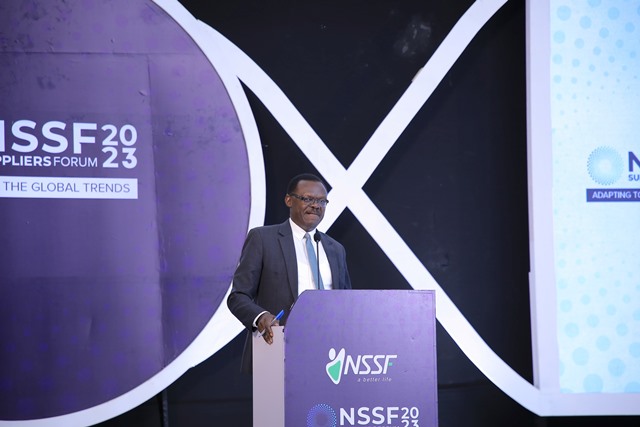Can you provide a service to the extent that your customer is glad you are a vendor, NSSF asks suppliers
In the next financial year the National Social Security Fund (NSSF) is set to spend significant amounts of money in sectors like real estate, IT, consultancy, insurance and furniture.

In the next financial year, the National Social Security Fund (NSSF) is set to spend significant amounts of money in sectors like real estate, IT, consultancy, insurance and furniture.
Specifically, Shs1.7 trillion will go into real estate, Shs36 billion to buy IT systems, Shs12 billion for consultancy, Shs2.7 billion to procure furniture and fixtures, Shs5 billion to get insurance and Shs5 billion for advertising and promotions.
This spending gives suppliers intending to work with NSSF a chance to make money. This money should go to the right suppliers, at least going by what the ag Managing Director, Patrick Ayota said Tuesday at the 7th NSSF Suppliers Forum.
He asked, “Can you provide a level of service to the extent that your customer is glad you are a vendor? That is what we expect of you as our vendor. We have a purpose to make lives better by making savings a way of life.”
He revealed that by 2035 NSSF wants to move the 10% coverage of Ugandans to 50%. “That means that we cannot depend on the formal sector, we have to work with the informal sector,” he said.
Adding: It means that we need to be relevant, create products and intervene so that we can achieve this. We want to grow the Fund from Shs20 trillion to Shs50 trillion. We cannot do this on our own. This is where we need your help. We need partners to serve the labour force of Uganda,”
Ayota told the suppliers at the Forum that the NSSF Amendment Act 2022 opened up savings for everyone. He explained that the low coverage of social security presents an opportunity for growth and expansion.
Humphrey Ogwang, the Relationship Manager under Voluntary Membership at NSSF shared the opportunities the new NSSF Amendment Act presents.
He said the law now allows workers who are not on the payroll to remit savings and those on the payroll to top up which was not possible previously. The amendments to the law can now help many meet their retirement targets through savings.
“We are using forums like this and our financial literacy platform to reach out to many and inform them of this opportunity to save with dignity and have a secure life after retirement,” he said.
Gerald Mugabi, the Head of Procurement at NSSF, advised suppliers to always have a mitigation plan just in case they face disruptions in their supply chain process.
He said: “Diversify your supply base if you know you are getting items from a particular base, expand it further and find other options in the event of an emergency. To what extent do you go deep into your supplier chain base to find out the details of the tier system?”
Adding: “In the past, the supply chain was focused on the provision of service, cost and quality but because of global trends, we are focusing on your ability as a supplier to be agile i.e. if there is a challenge, how quickly can you jump on to an alternative.”
He said there is a need for businesses to focus on embedding Digital Transformation & Artificial Intelligence, Risk Mitigation and Supply Resilience Chain Supply into their business models.
Dr. Daniel Babikwa, the Director District Support Coordination & Public Education at NEMA encouraged NSSF to engage communities because they live closest to the resources. Unfortunately, many times they are ignored, he said.
Angela Ndawula, Head of Business and Institution Banking at Housing Finance Bank said the bank now offers contract financing, trade financing invoice discounting, and LPOs (Local Purchase Orders)to support the continuous operations of suppliers.
The bank also offers unsecured loans of up to Shs500 million within a remarkably short period of 2 hours. This expedited process ensures that suppliers can access the necessary funds without delay, Ndawula said.







